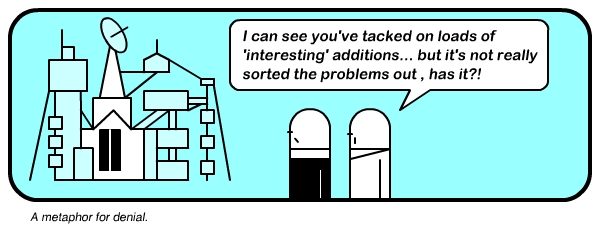 My wife Wendy has decided to play this song for our three girls every morning, just so she gets it all out of the way in 2 minutes and 55 seconds.
My wife Wendy has decided to play this song for our three girls every morning, just so she gets it all out of the way in 2 minutes and 55 seconds.
If you are a mother, have a mother, or know a mother, you will laugh!
The lyrics are included below the video.
Lyrics:
Get up now
Get up now
Get up out of bed
Wash your face
Brush your teeth
Comb your sleepyhead
Here’s your clothes and your shoes
Hear the words I said
Get up now! Get up and make your bed
Are you hot? Are you cold?
Are you wearing that?
Where’s your books and your lunch and your homework at?
Grab your coat and gloves and your scarf and hat
Don’t forget! You gotta feed the cat
Eat your breakfast, the experts tell us it’s the most important meal of all
Take your vitamins so you will grow up one day to be big and tall
Please remember the orthodontist will be seeing you at 3 today
Don’t forget your piano lesson is this afternoon so you must play
Don’t shovel
Chew slowly
But hurry
The bus is here
Be careful
Come back here
Did you wash behind your ears?
Play outside, don’t play rough, will you just play fair?
Be polite, make a friend, don’t forget to share
Work it out, wait your turn, never take a dare
Get along! Don’t make me come down there
Clean your room, fold your clothes, put your stuff away
Make your bed, do it now, do we have all day?
Were you born in a barn? Would you like some hay?
Can you even hear a word I say?
Answer the phone! Get off the phone!
Don’t sit so close, turn it down, no texting at the table
No more computer time tonight!
Your iPod’s my iPod if you don’t listen up
Where are you going and with whom and what time do you think you’re coming home?
Saying thank you, please, excuse me makes you welcome everywhere you roam
You’ll appreciate my wisdom someday when you’re older and you’re grown
Can’t wait till you have a couple little children of your own
You’ll thank me for the counsel I gave you so willingly
But right now I thank you not to roll your eyes at me
Close your mouth when you chew, would appreciate
Take a bite maybe two of the stuff you hate
Use your fork, do not burp or I’ll set you straight
Eat the food I put upon your plate
Get an A, get the door, don’t get smart with me
Get a grip, get in here, I’ll count to three
Get a job, get a life, get a PHD
Get a dose of,
“I don’t care who started it!
You’re grounded until you’re 36”
Get your story straight and tell the truth for once, for heaven’s sake
And if all your friends jumped off a cliff would you jump, too?
If I’ve said it once, I’ve said at least a thousand times before
That you’re too old to act this way
It must be your father’s DNA
Look at me when I am talking
Stand up straighter when you walk
A place for everything and everything must be in place
Stop crying or I’ll give you something real to cry about
Oh!
Brush your teeth, wash your face, put your PJs on
Get in bed, get a help, say a prayer with mom
Don’t forget, I love you
And tomorrow we will do this all again because a mom’s work never ends
You don’t need the reason why
Because, because, because, because
I said so, I said so, I said so, I said so
I’m the mom, the mom, the mom, the mom, the mom!!
Ta da!!!







 There was a time about a year ago, when I thought that if I heard the word “missional” one more time, I was going to throw up. Now, I have somewhat resigned myself to the fact that it is a term that is going to stick, and to a large degree, I am trying to live “missionally.”
There was a time about a year ago, when I thought that if I heard the word “missional” one more time, I was going to throw up. Now, I have somewhat resigned myself to the fact that it is a term that is going to stick, and to a large degree, I am trying to live “missionally.”
 I ran into someone this past week who would pose quite a dilemma for some, especially if we are
I ran into someone this past week who would pose quite a dilemma for some, especially if we are 
 Do you have to believe that Jesus is God in order to receive eternal life? Some people think so because of what John says in John 20:31.
Do you have to believe that Jesus is God in order to receive eternal life? Some people think so because of what John says in John 20:31.

 I sometimes hear pastors say that they don’t have systematic theology; they have pastoral theology.
I sometimes hear pastors say that they don’t have systematic theology; they have pastoral theology.

 Jennie Yabroff reported in Newsweek that “After A. J. Jacobs spent a year reading the Entire Encyclopedia Britannica for his book “The Know-It-All,” he figured he had the yearlong experiment thing down. How much harder could it be to follow every rule in the Bible? Much, much harder, he soon discovered, as he found himself growing his beard, struggling not to curse, and asking strangers for permission to stone them for adultery.”
Jennie Yabroff reported in Newsweek that “After A. J. Jacobs spent a year reading the Entire Encyclopedia Britannica for his book “The Know-It-All,” he figured he had the yearlong experiment thing down. How much harder could it be to follow every rule in the Bible? Much, much harder, he soon discovered, as he found himself growing his beard, struggling not to curse, and asking strangers for permission to stone them for adultery.”
 I attended a church planting Conference in Irving, TX a while back in which
I attended a church planting Conference in Irving, TX a while back in which 


